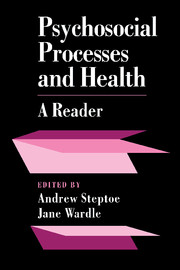Book contents
- Frontmatter
- Contents
- Preface
- Section 1 Life stress, social support and health
- Section 2 Psychophysiological processes in disease
- Section 3 Personality, behaviour patterns and health
- Section 4 Health practices and the modification of health risk behaviour
- Section 5 Coping with illness and disability
- Section 6 Behavioural interventions in medicine
- Index
Section 1 - Life stress, social support and health
Published online by Cambridge University Press: 05 August 2016
- Frontmatter
- Contents
- Preface
- Section 1 Life stress, social support and health
- Section 2 Psychophysiological processes in disease
- Section 3 Personality, behaviour patterns and health
- Section 4 Health practices and the modification of health risk behaviour
- Section 5 Coping with illness and disability
- Section 6 Behavioural interventions in medicine
- Index
Summary
Readings
Unemployment and mortality in the OPCS Longitudinal Study. K. A. Moser, A. J. Fox and D. R. Jones. Lancet, ii, 1324-9,1984.
Job strain, work place social support, and cardiovascular disease: a cross-sectional study of a random sample of the Swedish working population. J. V. Johnson and E. M. Hall. American Journal of Public Health, 78, 1336-42, 1988.
Social networks, host resistance, and mortality: a nine-year follow-up study of Alameda County residents. L. F. Berkman and S. L. Syme. American Journal of Epidemiology, 109,186-204, 1979.
Goal frustration and life events in the aetiology of painful gastrointestinal disorder. T. K. J. Craig and G. W. Brown. Journal of Psychosomatic Research, 28,411-21,1984.
Psychosocial assets, life crisis and the prognosis of pregnancy. K. B. Nuckolls, J. Cassel and B. H. Kaplan. American Journal of Epidemiology, 95, 431-41, 1972.
Introduction
Section 1 is concerned with the role of life stress in the development of illness. A variety of health problems are addressed, ranging from symptoms of cardiovascular and gastrointestinal disorders to mortality. The readings have been selected to illustrate a number of important themes.
The first theme is the operationalisation of adverse life experience. One of the major difficulties that bedevilled early work in psychosomatic medicine and stress research was that life experience was poorly characterised, and was assessed primarily through respondents’ retrospective reports. The fact that people with illnesses say that they were under stress before onset, contributes little to our understanding, since these reports may be biased by the person's health status, and by post hoc interpretations of their experience. The readings in Section 1 have taken various approaches to assessing life experience in a more objective way, involving the measurement of specific life events (Craig and Brown; Nuckolls et al.), chronic adverse circumstances such as job strain (Johnson and Hall), and the condition of unemployment (Moser et al.). They illustrate various strategies for deriving information about peoples’ experience of life that can be quantified and related to health outcome in a systematic fashion.
The second theme is that life stress is not simply a product of unpleasant occurrences, but also depends on the person's social and personal resources. Personality and behaviour patterns are discussed further in Section 3, so in this section the focus is on the social environment.
- Type
- Chapter
- Information
- Psychosocial Processes and HealthA Reader, pp. 1 - 11Publisher: Cambridge University PressPrint publication year: 1994

